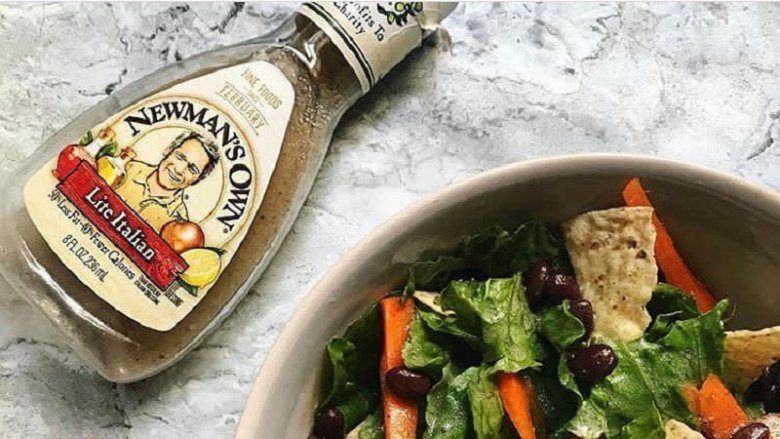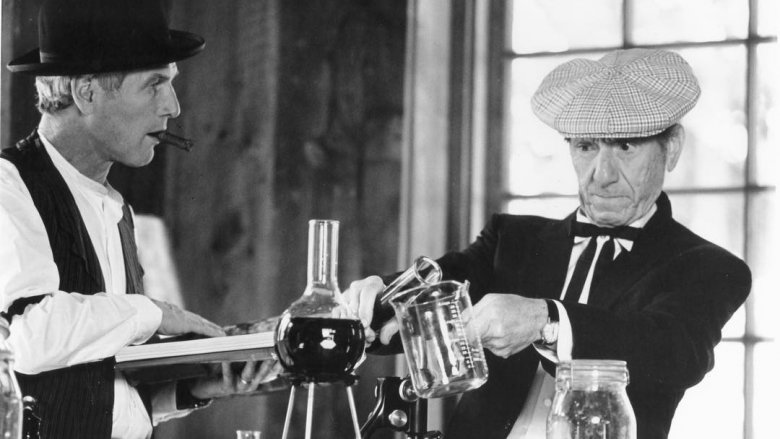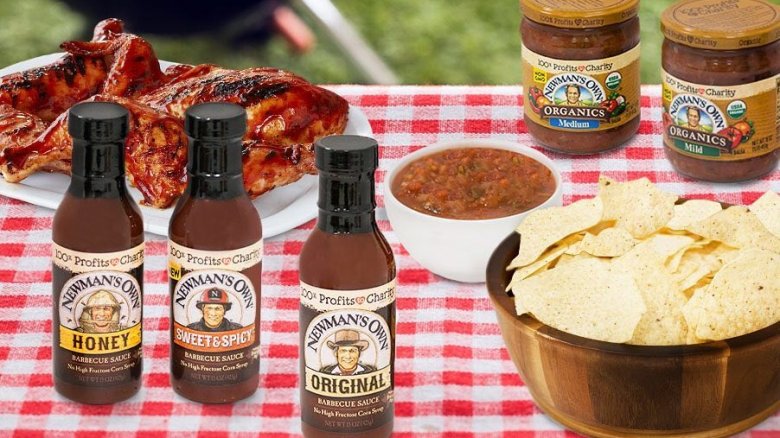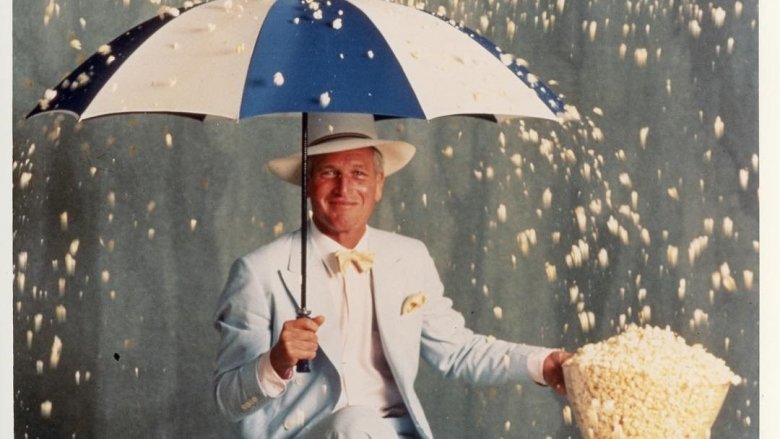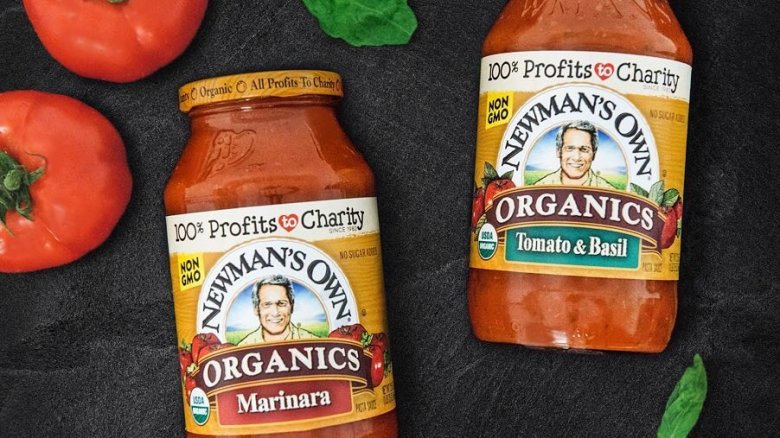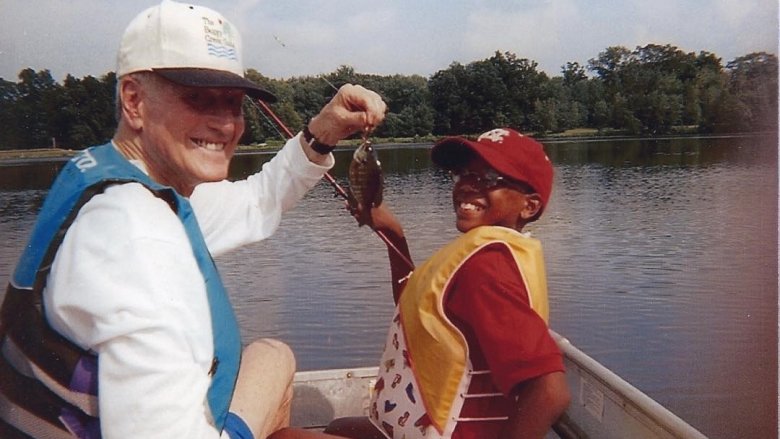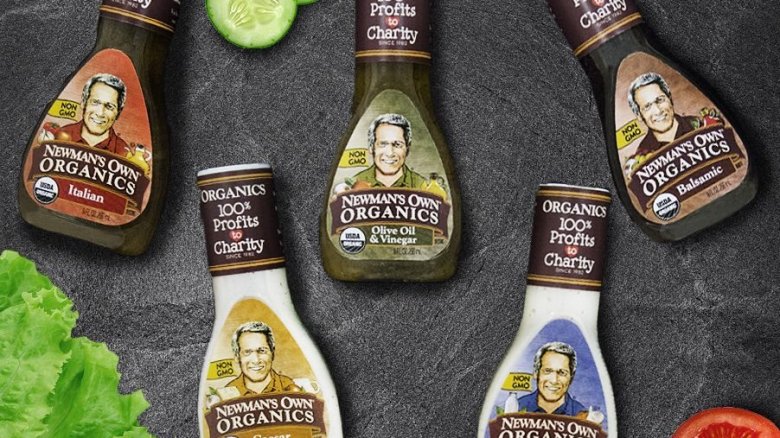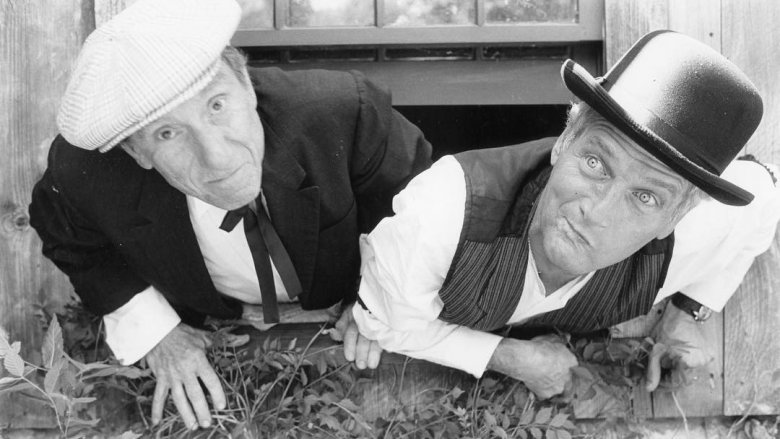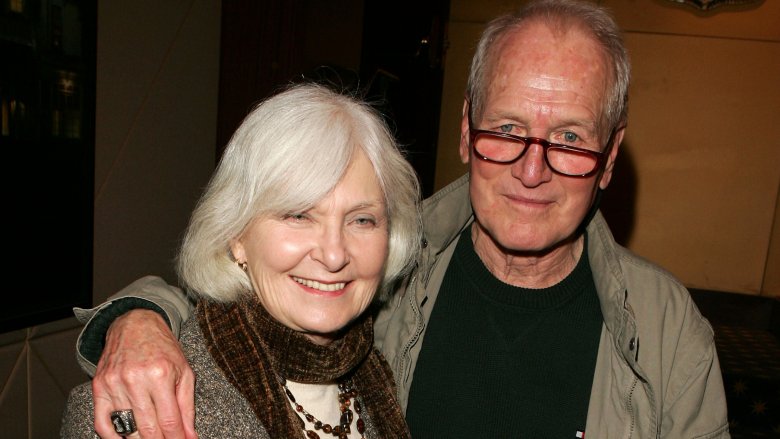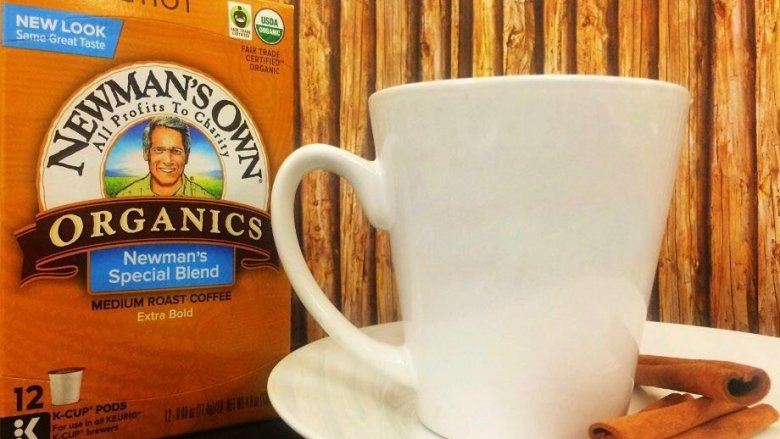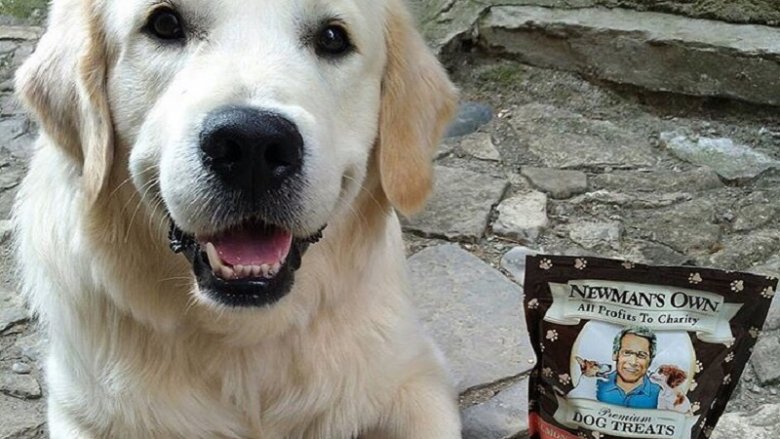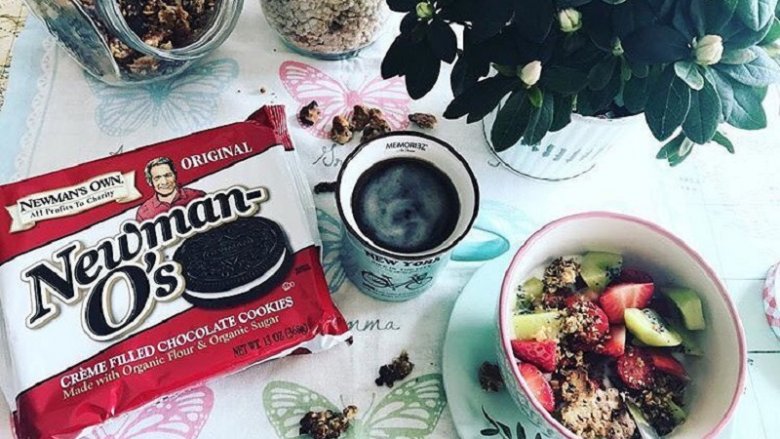The Untold Truth Of Newman's Own
First, the world knew Paul Newman as a movie star. Starting in the 1950s, he was front and center on the big screen playing a slew of characters Vanity Fair described as having one thing in common: an "icy masculine cool." Having his picture on a line of food products might seem like a bizarre leap to make, but according to his family — and particularly, his daughters — the development of Newman's Own was one of the things their father was most proud of. He wasn't a fan of the Hollywood life, the glitz, and the glamour, but he was a fan of making a difference. He saw he could do that through food, and what happened next makes a fascinating tale.
The entire company started as a joke
Writer and Hemingway biographer AE Hotchner was involved in Newman's Own from the beginning. He chatted with The New York Times about his longtime friendship with Paul Newman, and said Newman would drive him crazy, calling him just to talk salad dressing. "Oh, it was murder," Hotchner says. "Just murder. Calling me constantly."
He also told the unlikely story of how the first and most famous Newman's Own product was invented. Like most great things, it started with the two men just hanging out in a barn and drinking beer. It was winter of 1980, and they were mixing up a vat of salad dressing to bottle and give away as Christmas gifts. Hotchner says they were fortunate no one died: when they didn't have anything to stir the vat with, Newman went outside, grabbed a canoe paddle, and started stirring. There was nothing sterile about the environment, which Hotchner has said involved a washtub of ingredients and old wine bottles. "It was ridiculous, but it was fun." They bottled the dressing, went caroling, distributed the bottles, and neighbors were thrilled. They were so thrilled, in fact, that it planted the seeds of Newman's Own.
They got a helping hand from Martha Stewart
When they were first starting out, they were told that just putting a celebrity face — no matter how handsome — on a product was no guarantee of success. Time lists a whole host of failed celebrity endeavors, and says Newman was told, "[..] just because they liked you as Butch Cassidy doesn't mean they'll like your salad dressing."
Even as they were ironing out the inevitable kinks in logistics, they decided they needed to find out how good they really were. Fortunately, they knew someone who could organize a blind taste test for them. She was a caterer named Martha Stewart, and she set them up with a panel of judges. Every single one ranked Newman's dressing number one... save two, who put them in second place. They were incorporated the next day.
A lot of the "stories" told about each product were just made up
Paul Newman wasn't 100 percent behind every part of the business plan, though, and he hated the idea of putting his own face on the products. In fact, Time says his initial reaction to Hotchner's suggestion was, "My face on a bottle of salad dressing? Not a chance in hell." Hotchner won, though, and those labels are an undeniable part of the brand.
Take a closer look at some, and you'll see there's a story that goes along with the product. Grist talked to Newman's daughter, Nell, about a few of them, including the story on the organic pretzels that claims Newman forfeited his home to his daughter when she proved she could come up with an amazing organic pretzel. It's not true, she says, and neither is the story about Newman bringing the recipe to Newman's Own Fra Diavolo Pasta Sauce back from Hell. Obviously — but according to Nell, the story got them banned in some places in the South. Anti-violence crusaders also took issue with the story of Newman's Own Butter Microwave Popcorn, which claimed he carried a machete to protect it. Again, not true, but that didn't stop people from getting mad about the labels.
Newman hated advertising his charitable donations
Newman's Own isn't just built on a movie star's image and a good product. Hotchner told Vanity Fair that right from the start, Newman didn't want to make any money off any of their sales — and when they made $920,000 in their first year, it was clear they were going to have to do something with it. It was Newman's idea to give all proceeds to charity, so that what's they did and what they still do.
You're familiar with the "100% Profits to Charity" phrase on their label, but according to Nell Newman, that almost wasn't there (and it was originally All Profits to Charity). She had to fight to get him to agree to include information about their charitable giving on the product labels — because he hated what he called "noisy philanthropy". He didn't want personal recognition for what they were doing, either. After he was awarded the Jean Hersholt Humanitarian Award at the 1994 Academy Awards, he vowed not to accept any more honors. A year later, he held a tuxedo-burning ceremony on his front lawn, just in case anyone thought he was going to be attending any more awards dinners.
He opened the Hole in the Wall Gang Camp with the earliest proceeds
One of the first endeavors funded by the proceeds from Newman's Own was The Hole in the Wall Gang Camp. It was announced in 1986 and opened in 1988, and the camp — inspired by Butch Cassidy and the Sundance Kid — was designed to be accessible to children with serious illnesses.
Slate's Dahlia Lithwick was a counselor there, and she wrote about how kids with serious, debilitating illnesses became regular kids once they got to camp. Newman himself showed up regularly, and when he did, he'd hoist the pirate flag and take a group out fishing. Lithwick says the camp did the same thing for him it did for the kids: It made him a normal, everyday sort of guy — especially considering that not many knew who he was. More and more programs have been added over the years, and there's now more than 30 similar camps operating under the SeriousFun Children's Network umbrella and serving tens of thousands of children every year... all because of salad dressing.
Newman's Own Organics came about because of Nell Newman's love of birds
In addition to Newman's Own, there's Newman's Own Organics. It wasn't Paul Newman that was behind this branch, but it was his daughter Nell who first pitched him the idea of incorporating an organic line of merchandise. The idea came after she started working with the Environmental Defense Fund, and she saw the damage pesticides were doing not to just the environment, but to her beloved — and endangered — birds. According to her, convincing her father wasn't easy.
It was 1992, and Nell Newman told Grist that her father still believed calling something "organic" meant it was unappetizing and tasteless... until she arranged for the ingredients for an organic Thanksgiving dinner to be shipped to their Connecticut home from California. She only told him it was organic after they'd enjoyed the meal, and sealed the deal by telling him that pretzels would be their first product, because pretzels were his favorite. In exchange, he allowed her to start her own organics line under the Newman's Own umbrella with money from the company, as long as she promised to pay it back. She promised, and she did pay it all back — within a single year.
Newman's Own ice cream is actually Ben & Jerry's
When Newman's Own was just getting off the ground, one of the first things that became painfully obvious was the difficulty of mass-producing recipes on a commercial scale, while still keeping the quality where the founders wanted. That meant outsourcing, and one of the most surprising manufacturers of a Newman's Own product is none other than your old friends, Ben and Jerry. They're the brains behind Newman's Own All Natural Ice Cream, and it makes sense — especially when you see flavor names like Pistol Packin' Praline Pecan.
They officially announced their alliance way back in 1998, and it's a win-win for everyone involved. Ben & Jerry's also has a well-known commitment to charity and philanthropy, and along with the partnership it was also announced that the "100% Profits to Charity" applies to the ice cream, too.
What Paul Newman wanted for the company
In 1999, Paul Newman turned 75. When he did, he wrote a letter to his entire family, and his longtime friend and attorney drafted up plans for his personal estate and Newman's Own. The letter included handing over major decisions — like which charities would benefit from the Newman's Own proceeds — to his daughters. By 2007, he had completely withdrawn from the day-to-day and business side of the company, and brought in a board of directors that included chairman Robert Forrester. In the meantime, he said each of his daughters would be set up with their own foundation, but it wasn't all that straightforward. His trust and will had been amended at least 12 times, and this is where it all gets a little fuzzy.
In the years leading up to Newman's 2008 passing, his daughters were regularly told their own charitable foundations would be funded from the estate, and they would have a say in the future of Newman's Own, as well as a designated place on the board of directors and the board of the Hole in the Wall Gang Camps. Simple enough, right?
Newman's daughters claim it's no longer being run the way their father wanted
Newman was diagnosed with lung cancer in 2007, and in the weeks afterwards, major changes were made to his will. It was completely rewritten in April 2008, six months before his death and four months before his doctors made more notes about continued memory loss. Forrester insists that he was lucid, but his daughters claim otherwise.
When his will was read, provisions securing his daughters' positions on the Newman's Own board were gone. Two months before his death, he had added Robert Forrester and Brian Murphy as his company equals, essentially giving them control of the entire company. Each daughter's personal foundation was now under the ultimate control of Forrester and his board of directors, and in 2015 they came forward with claims that not only were they being handcuffed by these new additions to the estate, but they're not alone. Outrage followed the de-funding of the Scott Newman Center, set up in honor of Newman's son, and the Newman/Haas Racing team — changes the family say he never would have wanted. Nell Newman was even forcibly removed from Newman's Own Organics, and the questions remains as to whether or not Paul Newman's actual wishes are being honored.
They've had to rethink marketing for Millennials
Amid all the controversy over whether or not he's actually doing what Paul Newman wanted for the company, Robert Forrester is also revamping their marketing strategy to reach a new crowd who isn't as familiar with Paul Newman the actor as people were when the company started. In 2016, they kick-started a marketing campaign that focused on their charitable giving... which was, ironically, exactly the story of "noisy philanthropy" Newman himself had hated so passionately.
The banner that Newman had protested against now reads, "100% Profits to Charity," and the company financed videos detailing some of their charitable giving and the organizations they work with. The videos made their way to social media, driven by surveys that showed only about 12 percent of millennials knew all the proceeds were donated to charity. Forrester says Newman would approve of the change... in spite of having been against advertising their work for so long.
They're hitting the $500 million mark in 2017
When Paul Newman decided to give all the proceeds from selling his original oil-and-vinegar salad dressing to charity, there's no way he could have known just how big it would get. In 2017, they announced they were on their way to hitting a major milestone: $500 million given to charities. In 2016 alone, they gave away almost $30 million, and that's insanely impressive... even though it's a bittersweet milestone that's left some of the Newman daughters wishing they had been allowed to remain more active in the company and its foundations.
Over the years, more than 600 organizations have received donations from Newman's Own. They're always looking for more organizations to partner with, too, and when it comes to deciding who's going to reap the rewards, they look for organizations with a focus on children, nutrition, and charities that empower their people — especially military veterans. They also look at organizations that depend on fundraising for most of their work, and that? Everyone can at least agree that Paul Newman would still be proud of that.
